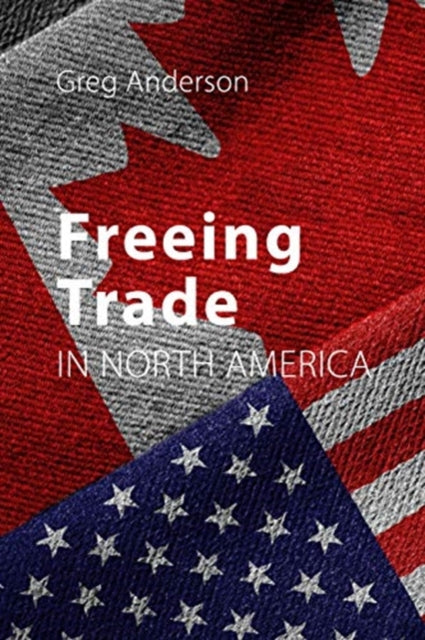GregAnderson
Freeing Trade in North America
Freeing Trade in North America
YOU SAVE £1.44
- Condition: Brand new
- UK Delivery times: Usually arrives within 2 - 3 working days
- UK Shipping: Fee starts at £2.39. Subject to product weight & dimension
Bulk ordering. Want 15 or more copies? Get a personalised quote and bigger discounts. Learn more about bulk orders.
Couldn't load pickup availability
- More about Freeing Trade in North America
The North American Free Trade Agreement (NAFTA) was signed in 1994 to create a regional trade bloc between Canada, Mexico, and the United States. It aimed to eliminate trade friction and costs but never reached the levels of integration achieved by the European Union. Under Trump's administration, the trilateral trade agreement has become increasingly precarious. This book provides an overview of NAFTA and its successor, the USCMA, explaining the theory behind the politics and economics of trade in North America and offering an accessible and concise analysis of the key provisions, shortcomings, and past revision efforts.
Format: Paperback / softback
Length: 208 pages
Publication date: 21 November 2019
Publisher: Agenda Publishing
The North American Free Trade Agreement (NAFTA), a historic agreement signed in 1994, brought together Canada, Mexico, and the United States with the ambitious goal of establishing a vibrant regional trade bloc. This transformative initiative aimed to eliminate trade barriers, reduce friction, and foster economic cooperation among the three nations. While NAFTA was conceived in a period of rapid post-Cold War economic liberalization, it never achieved the level of integration seen in the European Union. Some viewed it as a missed opportunity, as it fell short of creating a truly unified single market. However, under the administration of former President Trump, the future of NAFTA became increasingly uncertain.
This book serves as a comprehensive guide to NAFTA and its successor, the United States-Mexico-Canada Agreement (USCMA). It delves into the theoretical foundations of trade politics and economics in North America, offering an accessible and concise analysis of the key provisions, shortcomings, and past revision efforts of the governments involved. In a context of growing protectionism and heightened awareness of trading relationships, the book sheds light on the lessons learned from the complex history of one of the world's largest trade blocs.
NAFTA was designed to promote free trade and investment across the continent, removing tariffs and other trade barriers. It aimed to create a seamless market for goods and services, allowing businesses to operate efficiently and expand their operations. The agreement also included provisions for intellectual property protection, labor standards, and environmental regulations to ensure a level playing field for all participants.
However, NAFTA has faced its share of challenges throughout its existence. Critics argue that it has led to job losses in certain industries, particularly in the United States, as companies sought to relocate production to countries with lower labor costs. Additionally, some argue that NAFTA has contributed to income inequality by favoring large corporations and outsourcing jobs to Mexico.
To address these concerns, the governments involved in NAFTA have engaged in several rounds of renegotiation and revision. The most recent round, known as the USMCA, was signed in 2018 and aimed to modernize and update the original agreement. The new agreement includes provisions to address concerns about labor standards, intellectual property protection, and digital trade.
Despite these revisions, there are still concerns about the impact of the USMCA on trade between the three nations. Some critics argue that it fails to address the issues of income inequality and job losses, while others argue that it may lead to increased trade tensions with China.
In conclusion, NAFTA and its successor, the USCMA, have played a significant role in shaping the trade landscape in North America. While it has faced its share of challenges, it has also brought economic benefits and opportunities to the region. As the world continues to evolve, it will be important to monitor the impact of trade agreements on the economies and societies of all nations. This book provides valuable insights into the history, politics, and economics of NAFTA and its successor, and serves as a valuable resource for policymakers, business leaders, and interested individuals.
Weight: 332g
Dimension: 234 x 156 x 15 (mm)
ISBN-13: 9781788210614
This item can be found in:
UK and International shipping information
UK and International shipping information
UK Delivery and returns information:
- Delivery within 2 - 3 days when ordering in the UK.
- Shipping fee for UK customers from £2.39. Fully tracked shipping service available.
- Returns policy: Return within 30 days of receipt for full refund.
International deliveries:
Shulph Ink now ships to Australia, Belgium, Canada, France, Germany, Ireland, Italy, India, Luxembourg Saudi Arabia, Singapore, Spain, Netherlands, New Zealand, United Arab Emirates, United States of America.
- Delivery times: within 5 - 10 days for international orders.
- Shipping fee: charges vary for overseas orders. Only tracked services are available for most international orders. Some countries have untracked shipping options.
- Customs charges: If ordering to addresses outside the United Kingdom, you may or may not incur additional customs and duties fees during local delivery.


